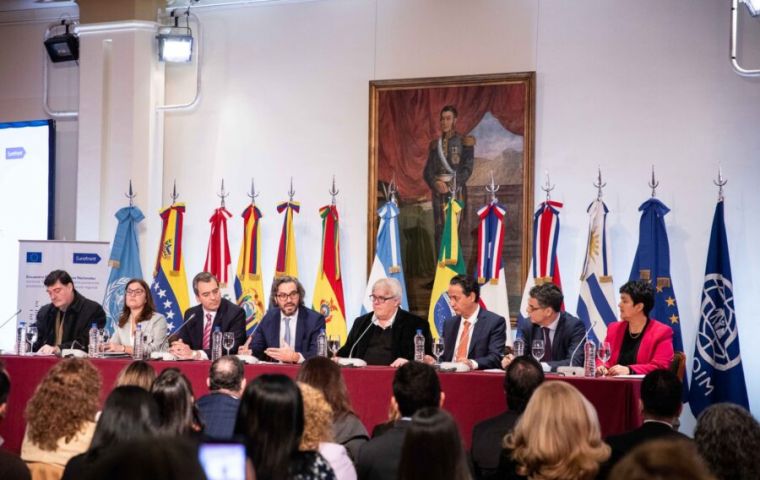MercoPress. South Atlantic News Agency
Argentine authorities highlight actions taken against human trafficking
 At least 216 children and adolescents were rescued in recent years from what Cafiero dubbed as “21st Century slavery”
At least 216 children and adolescents were rescued in recent years from what Cafiero dubbed as “21st Century slavery” Argentine Ministers Santiago Cafiero (Foreign Affairs) and Martín Soria (Justice and Human Rights) Friday highlighted the implementation of the Fund for Direct Assistance to Victims of Trafficking, during a series of roundtables at the San Martín Palace marking World Day against People Trafficking.
The officials also underlined the innovative mechanism existing in the country which “makes it possible to use the assets and money of criminal gangs to directly assist the victims” in order to economically repair the damages suffered. They also pointed out that such a scheme was “unique in the region.”
The event, which was held to raise awareness on the matter, was focused on prevention, victim assistance, and regional cooperation.
“Thanks to the steps taken during 2021, before the Bank of Investment and Foreign Trade, we managed to put the Assistance Fund into operation and, after a great work carried out jointly between the different agencies and powers of the State, last Tuesday, on July 26, from the Ministry of Justice we managed to make the first disbursement in the history of the direct fund for the economic reparation of a victim of trafficking in the framework of a judicial case,” Soria said.
Cafiero then addressed the work undertaken by consulates worldwide tracking these cases: “This task is one of the axes of the consular policy of the Ministry of Foreign Affairs. We are in permanent coordination not only with the national areas in this matter, but also with the entire international network to work more efficiently on this issue, which represents slavery in the 21st century” and is “one of the most serious crimes of human rights violation, where social, political, migratory, economic and gender issues converge. It is the third most profitable crime on a global scale of organized crime,” he also explained.
“The national State in its three branches deploys the necessary public policies to ensure prevention, protection, reparation, and access to justice for the victims and also the punishment for the criminals,” Cafiero added.
Soria also underscored his Ministry's 29 actions undertaken through the Biennial Plan 2020-2022, which included training of prosecutors, law enforcement officers, and judiciary clerks in virtual and face-to-face formats.
The initiative also included delegations from Brazil, Bolivia, Chile, Colombia, Ecuador, Paraguay, Peru, Uruguay, and Venezuela.




Top Comments
Disclaimer & comment rulesCommenting for this story is now closed.
If you have a Facebook account, become a fan and comment on our Facebook Page!